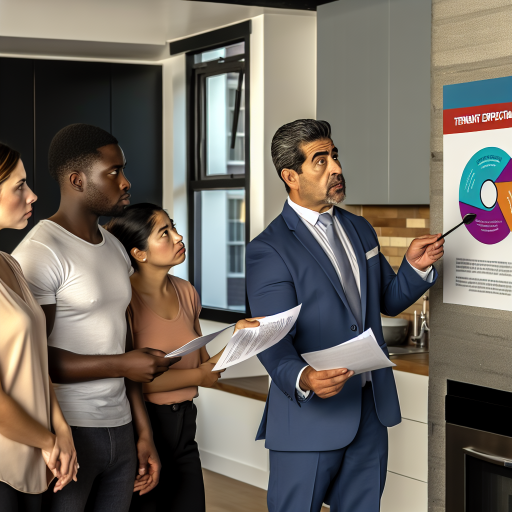Introduction
DIY property management has gained popularity among landlords seeking cost savings, but beware of DIY property management pitfalls.
Many believe managing their own properties will increase profits.
However, this approach carries significant challenges.
Without professional assistance, landlords may face various pitfalls.
Issues like tenant screening, maintenance, and legal compliance can become overwhelming.
Mismanaging these responsibilities can lead to financial losses and legal troubles.
Inexperienced landlords might struggle with tenant relations, which is vital for a successful rental experience.
Poor communication can result in misunderstandings that escalate into disputes.
These conflicts can result in time-consuming evictions and legal fees, which eat into profits.
Moreover, many landlords underestimate the time commitment necessary for effective management.
Routine tasks like collecting rent and addressing maintenance requests can consume valuable time.
If neglected, these tasks can lead to dissatisfied tenants, increased vacancy rates, and ultimately reduced income.
Another common challenge is staying informed about local laws and regulations.
Landlords must understand rental agreements, fair housing laws, and eviction procedures.
Failure to comply can result in costly fines or legal actions.
Financial management also poses a challenge for many DIY landlords.
Setting competitive rental prices requires market knowledge and analysis.
Furthermore, landlords must budget for unexpected expenses, such as repairs or tenant turnover, which can disrupt cash flow.
To navigate these challenges successfully, landlords must prepare themselves with the right knowledge and resources.
Establishing a clear management plan can help streamline operations.
Utilizing technology can also aid in organization, communication, and tracking finances.
Understanding the potential pitfalls and proactively addressing them is essential for success.
When landlords prepare adequately for DIY property management, they can optimize their rental experience.
Achieving this balance requires diligent effort and a willingness to learn and adapt.
Understanding Your Responsibilities as a Landlord
As a landlord, you hold a crucial position in the rental market.
Understanding your responsibilities is essential to ensure a successful and stress-free property management experience.
This section outlines the legal obligations and responsibilities every landlord must adhere to while offering practical advice for maintaining compliance.
Overview of Legal Obligations and Responsibilities
Landlords have numerous legal obligations that vary by jurisdiction.
Familiarizing yourself with these duties is vital to prevent liabilities.
Here are key areas where landlords are typically required to comply:
- Safety Standards: Landlords must ensure rental properties meet specific safety codes.
This includes installing smoke detectors, ensuring proper wiring, and adhering to fire safety regulations. - Health Regulations: Properties should be free of health hazards, like mold, pests, and structural deficiencies.
Landlords are responsible for maintaining a habitable environment. - Tenant Rights: Landlords must respect tenant rights, including the right to privacy and the right to enjoy their rented space without harassment.
Tenants should have access to their units without unwarranted intrusions. - Security Deposits: Laws govern how security deposits are collected, maintained, and returned.
Landlords must follow these rules meticulously. - Fair Housing Laws: Landlords must comply with regulations prohibiting discrimination based on race, gender, disability, and other characteristics.
Understanding these laws is key to treating all potential tenants fairly. - Eviction Procedures: If you need to remove a tenant, you must follow proper legal eviction procedures.
Avoiding shortcuts will prevent legal complications.
Importance of Keeping Up-to-Date with Local Landlord-Tenant Laws
Landlord-tenant laws can change frequently.
Staying informed ensures compliance and protects your investment.
Regularly reviewing local laws minimizes potential issues.
Here are ways to stay updated:
- Subscribe to Legal Updates: Many websites and organizations provide legal updates specific to property management.
Subscribing can help you stay informed about changes. - Join Professional Associations: Organizations such as the National Apartment Association or local landlord associations offer resources and training.
Membership can provide networking and educational opportunities. - Consult with Experts: Engaging legal counsel familiar with landlord-tenant law can protect you from costly mistakes.
Consider hiring a lawyer for guidance on complex issues. - Attend Workshops and Seminars: Many communities offer workshops.
These sessions cover changes in laws or best practices in property management. - Read Industry Publications: Magazines and online resources focus on real estate and property management.
Following these can help you stay informed about new trends and regulations.
Consequences of Neglecting Responsibilities
Neglecting your responsibilities as a landlord can lead to serious consequences.
Understanding the risks involved will encourage you to maintain compliance.
Here are some potential drawbacks of failing to fulfill your obligations:
- Legal Penalties: Non-compliance can result in fines.
Authorities can impose these fines for violation of health and safety codes. - Liability Issues: If a tenant experiences injury due to neglect, you may face lawsuits.
Legal action can cause financial strain. - Loss of Rental Income: Failing to provide habitable conditions can lead to tenant turnover.
Increased vacancy rates directly impact your revenue. - Reputation Damage: Poor maintenance and unresolved tenant issues can harm your reputation.
A negative image can deter future tenants. - Eviction Challenges: If you must evict a tenant, negligence can complicate the process.
A tenant may fight against an unjust eviction, prolonging the issue. - Difficulty with Inspections: Authorities conduct property inspections to enforce codes.
Failure to comply can lead to increased scrutiny from regulators.
In fact, understanding your responsibilities as a landlord is essential for effective property management.
Familiarize yourself with legal obligations, stay updated on local laws, and recognize the consequences of negligence.
Implementing best practices in these areas will help you navigate the complexities of property management successfully.
Empowering yourself with this knowledge equips you to provide safe, habitable properties for your tenants.
Adhering to these guidelines enhances your reputation while protecting your investment.
Setting Realistic Rental Prices
Setting realistic rental prices is crucial for successful property management.
Overpricing can chase away potential tenants.
Underpricing can lead to financial losses.
Therefore, accurate market research becomes essential.
It helps landlords align their rent with current market rates.
Importance of Market Research
Before setting rental rates, conduct thorough market research.
Understanding the local rental landscape is key.
It allows landlords to gauge competition and tenant expectations.
In turn, this information aids in establishing a fair price.
Here are some reasons why market research is vital:
- Understanding Local Demand: Know what tenants look for in your area.
- Identifying Competitors: Analyze similar properties nearby for their pricing strategies.
- Recognizing Trends: Stay informed about local economic conditions that impact rental prices.
- Avoiding Overpricing: Set a price that attracts tenants rather than deters them.
- Enhancing Cash Flow: Proper pricing improves occupancy rates and overall income.
Tools and Resources for Effective Market Analysis
Numerous tools can help landlords conduct effective market analysis.
Each tool provides valuable insights into the rental landscape.
Here are some resources you can utilize:
- Online Real Estate Platforms: Websites like Zillow and Realtor.com offer rental listings and price comparisons.
- Rental Property Software: Tools such as Roofstock and Rentec Direct assist in evaluating local rents.
- Local Rental Market Reports: Many real estate agencies publish reports with relevant data.
- Government Data: Check census data for demographic and economic statistics.
- Social Media Groups: Engage with landlord and tenant groups to gain insights.
Impact of Unrealistic Pricing on Occupancy Rates and Cash Flow
Setting an unrealistic rental price can negatively impact occupancy rates.
A high rental price may lead to extended vacancy periods.
This situation can quickly disrupt cash flow.
Below are some consequences of mispricing:
- Longer Vacancy Periods: Overpriced properties linger on the market.
- Reduced Income: Less revenue during vacant times affects your overall cash flow.
- Tenant Turnover: Even a slight adjustment can cause existing tenants to leave.
- Negative Perception: Sustained vacancies can lead to reputational damage.
- Increased Marketing Costs: Longer vacancies mean increased advertising effort and expense.
In contrast, setting a realistic price enhances attractiveness.
It can result in shorter vacancy times and a steady cash flow.
Landlords should regularly review their rental prices to stay competitive.
Adjustments based on market conditions can maximize income potential.
Tips for Setting Realistic Rental Prices
When establishing rental prices, keep these tips in mind:
- Analyze Comparable Properties: Look at prices of similar rental units nearby.
- Consider Property Features: Assess unique aspects, such as amenities and square footage.
- Stay Updated: Regularly monitor market trends and adjust prices accordingly.
- Set Prices Gradually: Consider incremental increases rather than sudden hikes.
- Seek Professional Appraisal: Use expert opinions to validate your pricing strategy.
By following these steps, landlords can avoid common pitfalls.
This approach helps in establishing a sound pricing strategy.
Furthermore, it supports business growth through improved occupancy rates.
Setting realistic rental prices involves more than guesswork.
Conducting market research is essential for informed decision-making.
Utilize various tools and resources to gauge the current rental landscape.
By doing so, you will better understand local competition and tenant needs.
Avoid the pitfalls of unrealistic pricing to maintain steady cash flow and high occupancy rates.
Remember, price adjustments should be an ongoing process.
Stay informed, and continually adapt to ensure your property’s success.
Read: How Smart Home Automation Can Maximize Rental Yields for Urban Properties
Effective Tenant Screening Processes
Overview of Essential Elements of Tenant Screening
Effective tenant screening is crucial for landlords seeking reliable tenants.
A robust screening process helps ensure that tenants can meet their financial obligations and respect the property.
Here are the essential elements of tenant screening:
- Background Checks: Conduct thorough background checks to uncover any criminal history.
This step helps gauge a tenant’s reliability and potential risks. - Credit Checks: Review the tenant’s credit history to assess their financial responsibility.
A good credit score typically reflects timely payments and financial stability. - Rental History: Contact previous landlords to verify the tenant’s rental history.
This reference check can provide insights into the tenant’s behavior and payment history.
Tips for Creating a Comprehensive Application Form
A well-structured application form is essential for gathering necessary information from potential tenants.
Here are some tips for creating a comprehensive application:
- Collect Personal Information: Request basic personal details, including name, email, and phone number.
This information facilitates communication during the process. - Employment Information: Ask for current employment details, including employer name and contact information.
This insight helps verify income stability. - Income Verification: Require applicants to provide proof of income, such as pay stubs.
This documentation ensures tenants can afford the rent. - References: Include sections for personal and professional references.
These references can help confirm the tenant’s reliability and stability. - Consent for Background Checks: Clearly state the applicant’s consent for you to perform background checks.
This transparency builds trust and adheres to legal standards. - Rental History: Request information about past rental addresses and landlords.
This information can help gauge a tenant’s past behavior.
Importance of Following Fair Housing Laws
Adhering to fair housing laws is vital for landlords to avoid discrimination claims.
Here are some key points to keep in mind:
- Understand the Laws: Familiarize yourself with federal, state, and local fair housing laws.
Awareness of these guidelines helps protect you from legal issues. - Consistency in Screening: Apply the same screening criteria to all applicants.
Consistency prevents discriminatory practices and ensures fairness. - Document Everything: Keep thorough records of all applications and communication.
This documentation can serve as evidence in case of disputes. - Avoid Discriminatory Language: Be cautious with the language used in advertisements and applications.
Avoid terms that might indicate a preference for or against certain groups. - Training and Education: Invest time in training about fair housing laws for yourself and your staff.
Knowledge helps create a non-discriminatory environment.
In short, effective tenant screening processes involve several critical elements.
Background checks, credit verification, and rental history are essential to identify qualified tenants.
Creating a thorough application form helps gather necessary information efficiently.
Following fair housing laws protects landlords from potential discrimination claims.
By understanding these laws and implementing consistent screening practices, landlords can foster a fair and reliable rental environment.
Avoiding the pitfalls of DIY property management begins with effective tenant screening.
Ensure each element is executed carefully to avoid headaches in the future.
A little effort spent upfront can save significant troubles later on.
Read: Top Property Management Tips to Maximize Your Rental Income

Developing a Comprehensive Lease Agreement
Creating a comprehensive lease agreement is vital in property management.
A well-structured lease protects both parties— landlords and tenants.
Therefore, landlords need to include essential components in their lease agreements.
By doing so, they can prevent misunderstandings and future conflicts.
Key Components to Include in a Lease Agreement
Each lease agreement should contain specific terms and conditions.
Here are critical components to incorporate:
- Names of Parties: Clearly state the names of all tenants and the landlord.
- Property Description: Provide an accurate description of the rental property.
- Lease Term: Specify the duration of the lease, including start and end dates.
- Rental Amount: Clearly outline the rent amount and due date each month.
- Security Deposit: Include details about the security deposit and conditions for its return.
- Maintenance Responsibilities: Define who is responsible for repairs and maintenance.
- Utilities: Specify which utilities are covered by the landlord and which by the tenant.
- Pet Policy: Clearly state whether pets are allowed and under what conditions.
- Late Fees: Outline penalties for late rent payments.
- Rules and Regulations: Include any specific rules related to the property or community.
- Termination Clauses: Define the process for terminating the lease by either party.
Importance of Clarity and Detail
Clarity and detail in a lease agreement are crucial.
Ambiguity can lead to misunderstandings, often causing disputes.
Misinterpretations can create a hostile environment between landlords and tenants.
Therefore, well-defined terms help in maintaining smooth communication.
Consider a few points for enhancing clarity:
- Use Simple Language: Avoid legal jargon that may confuse tenants.
- Be Specific: Specific terms reduce the chance of varying interpretations.
- Provide Examples: Include examples for complicated provisions, such as maintenance responsibilities.
- Review with a Professional: Consult a lawyer or property management expert for legal compliance.
Necessity of Signing and Keeping Copies
Having both parties sign the lease agreement is essential.
It serves as a legal contract that binds both the landlord and tenant.
Each party must keep a copy of the lease for future reference.
This ensures that both parties have access to the agreed-upon terms.
Furthermore, retaining signed copies helps in the resolution of disputes.
In case of disagreements, landlords and tenants can refer to the original lease.
This practice protects both parties legally and provides peace of mind.
Completing a comprehensive lease agreement can be time-consuming but is worth the effort.
Investing time in drafting a thorough document saves landlords from future headaches.
Ultimately, a well-defined lease can prevent costly pitfalls in property management.
By including all necessary components, landlords can create solid agreements.
This approach minimizes misunderstandings and enhances the landlord-tenant relationship.
In essence, a comprehensive lease agreement is foundational in property management.
Landlords must ensure that their agreements contain clear and detailed terms.
Including all essential components protects both parties and fosters a positive renting experience.
Therefore, remember to review the lease carefully before signing.
Read: Guide to Converting Office Buildings into Apartments in the US
Handling Maintenance and Repairs
Managing property maintenance and repairs effectively is crucial for landlords.
It ensures tenant satisfaction and preserves the property’s value.
Below, we will delve into several strategies to handle maintenance efficiently.
Each tip will guide you in preventing issues while addressing necessary repairs promptly.
Regular Inspections
Conducting regular inspections is essential in property management.
Inspections help identify potential problems before they escalate into costly repairs.
Schedule inspections at least twice a year.
- Check for Damage: Look for cracks in walls, water stains, and other signs of wear.
- Inspect Systems: Ensure heating, plumbing, and electrical systems function properly.
- Evaluate Outdoor Areas: Regularly assess driveways, roofs, and landscaping to prevent future issues.
- Document Findings: Maintain records of what you observe, making it easier to track repairs over time.
Performing these inspections not only prevents bigger problems but also builds trust with your tenants.
They appreciate a landlord who takes property upkeep seriously.
Preventive Maintenance
Preventive maintenance is essential in property management.
This proactive approach reduces the frequency and costs of emergency repairs.
Adopt a regular maintenance schedule, and stick to it.
- Seasonal Maintenance: Prepare your property for changing seasons.
Services like HVAC check-ups or gutter cleaning are necessary for efficiency. - Appliance Servicing: Regularly inspect appliances to ensure they operate as intended.
This can prolong their lifespan and enhance tenant comfort. - Pest Control: Implement consistent pest management to avoid infestations.
Schedule professional treatments regularly. - Upgrade Fixtures: Replace outdated fixtures and appliances.
This not only attracts tenants but also reduces repair costs.
Your goal is to create a safe and comfortable living environment.
Regular preventive measures can minimize repairs and enhance tenant satisfaction.
Reliable Network of Contractors
Building a dependable network of contractors is essential for effective property management.
Establishing strong relationships with reliable service providers saves time and ensures quality repairs.
- Research Local Contractors: Find reputable contractors in your area.
Reviews and recommendations from other landlords can be very helpful. - Build Relationships: Develop long-term relationships with a small number of contractors.
This familiarity can lead to better prices and quicker service. - Get Multiple Quotes: Always seek quotes from several contractors for larger projects.
This helps ensure you get a fair price. - Negotiate Rates: Once you establish relationships, don’t hesitate to negotiate rates or ask for discounts.
This network becomes invaluable, particularly during emergencies.
With a reliable list of contractors, you can respond quickly to maintenance needs, demonstrating your professionalism.
Handling Emergency Repairs
Emergencies can occur at any time.
Understanding how to handle these situations ensures safety and tenant satisfaction.
Develop a plan to manage emergency repairs effectively.
- Establish Emergency Protocols: Create clear procedures for tenants to report emergencies.
Ensure they know who to contact after hours. - Maintain a 24/7 Contact Number: Provide tenants with a number they can call in emergencies.
Ensure that someone answers quickly. - Prioritize Safety: Immediately address significant safety issues like gas leaks or flooding.
Tenant safety is paramount. - Follow-Up After Repairs: After an emergency repair, check back with tenants.
This shows you care about their comfort and safety.
Having a solid plan in place for emergencies minimizes stress.
It allows you to manage situations swiftly and efficiently, keeping tenants happy.
Effective Tenant Communications
Good communication with tenants is critical in property management.
Clear dialogue fosters a positive landlord-tenant relationship.
Here are some tips for effective tenant communications.
- Set Expectations Early: At lease signing, outline your maintenance processes and response times.
Clarity will reduce misunderstandings later. - Be Responsive: Respond to tenant inquiries and maintenance requests promptly.
Ignoring requests can lead to frustration and resentment. - Provide Regular Updates: Keep tenants informed about maintenance schedules or project timelines.
Communication reassures them that you prioritize their comfort. - Create a Maintenance Request System: Implement an easy method for tenants to report issues, such as a dedicated email or app.
Fostering excellent communication helps you build trust and satisfaction among tenants.
Happy tenants tend to stay longer and help maintain your property’s condition.
Managing property maintenance effectively requires strategic planning and organization.
Through regular inspections and preventive measures, you minimize future problems.
Building a reliable network of contractors ensures timely repairs.
Having a clear plan for emergencies keeps tenants safe and reassured.
Finally, maintaining good communication fosters a positive relationship with renters.
Implementing these tips will help you avoid the pitfalls of DIY property management.
By being proactive, you ensure your properties remain well-kept and your tenants satisfied.
Read: Mastering Lease Management: Best Practices
Navigating Tenant Relations and Communication
The landlord-tenant relationship significantly impacts property management success.
Establishing rapport and effective communication fosters a trusting environment.
Understanding tenant expectations and providing solutions can enhance satisfaction.
Here, we outline key aspects of tenant relations and effective communication.
Importance of Establishing Clear Communication Channels with Tenants
Clear communication sets the foundation for a successful landlord-tenant relationship.
Effective communication helps avoid misunderstandings regarding property rules and obligations.
- Accessibility: Tenants should feel comfortable reaching out.
Provide multiple contact methods such as email, phone, and even text messaging. - Timeliness: Respond to tenant inquiries promptly.
Fast responses can prevent frustrations and show tenants their concerns matter. - Transparency: Share relevant information openly.
Whether discussing maintenance issues or lease changes, transparency fosters trust. - Regular Updates: Keep tenants informed about property changes, maintenance schedules, or community events.
Regular communication helps tenants feel valued and included. - Consistent Messaging: Use the same tone and style across all communication channels.
Consistency reinforces your professionalism and sets expectations.
Establishing clear communication channels is vital for managing tenant relationships.
It ensures stress-free interactions and promotes a collaborative atmosphere.
Strategies for Handling Conflicts and Disputes Professionally
Conflicts can arise, even in the best relationships.
Professional handling of disputes prevents escalation and fosters long-term satisfaction.
- Stay Calm: Approach conflicts with a level head.
Reacting emotionally can worsen the situation. - Listen Actively: Let tenants express their concerns.
Active listening shows you value their perspective. - Seek to Understand: Ask clarifying questions to fully grasp the issue.
This demonstrates empathy and encourages open communication. - Avoid Blame: Focus on finding solutions rather than placing blame.
A collaborative approach leads to easier resolutions. - Document Everything: Keep records of all communications regarding the dispute.
Documentation serves as a reference for future interactions. - Negotiate Solutions: Work collaboratively to find viable solutions.
Negotiation helps both parties feel heard and valued. - Know When to Escalate: If a resolution isn’t possible, consider involving a mediator or other professionals.
Escalation might be necessary for more severe issues.
By handling conflicts professionally, landlords maintain relationships and enhance tenant satisfaction.
It creates a more harmonious living environment for everyone involved.
The Role of Empathy and Active Listening in Maintaining Positive Tenant Relationships
Empathy plays an essential role in building strong landlord-tenant relationships.
Understanding tenant perspectives promotes goodwill and responsiveness.
- Practice Empathy: Put yourself in your tenant’s shoes.
Consider their perspective when assessing their concerns or requests. - Be Approachable: Foster an open-door policy.
Tenants should feel they can approach you with questions or issues without hesitation. - Regular Check-Ins: Schedule periodic check-ins with tenants.
A simple call or email inquiring about their satisfaction can show you care. - Maintain Professional Boundaries: While being friendly is important, remember to keep boundaries in place.
Professionalism must remain a priority. - Provide Resources: Equip tenants with information about local services.
This demonstrates your commitment to their comfort and well-being. - Encourage Feedback: Create opportunities for tenants to provide feedback on their experience.
Utilize surveys or suggestion boxes for anonymous input. - Respond to Needs: Take tenants’ needs seriously and act accordingly.
Quick resolution of issues significantly boosts tenant satisfaction.
Empathy and active listening enhance your property management approach.
Tenants who feel understood are more likely to remain satisfied and renew leases.
Navigating tenant relations requires diligence and effort.
Clear communication, conflict resolution strategies, and empathy are crucial elements.
Take the time to cultivate positive relationships, and the benefits will far outweigh the challenges.
Happy tenants are not only more likely to renew leases, but they may also recommend your properties to others, enhancing your reputation in the marketplace.
By focusing on these areas, landlords can avoid common pitfalls of DIY property management.
Successful tenant relations lay the groundwork for lasting success in rental property management.
Keeping Accurate Financial Records
As a landlord, maintaining precise financial records is crucial for your property management success.
Without clear financial documentation, you may face significant challenges in running your rental business.
Essential Financial Documents Landlords Should Maintain
The following essential documents will help you track your property’s financial health effectively:
- Income Statements: These documents summarize rental income, providing a clear view of your revenue.
- Expenditure Logs: Keep track of all property-related expenses, including maintenance, repairs, and utilities.
- Leases and Rental Agreements: Maintain copies of all leases and agreements to track terms and payment schedules.
- Receipts and Invoices: Collect all receipts and invoices to substantiate your income and expenses.
- Bank Statements: Regularly review your bank statements to reconcile your accounts and ensure accuracy.
- Tax Documentation: Gather important tax documents, including previous tax returns, for accurate reporting.
By organizing these documents, you will streamline your financial management process.
It will also simplify communication with your accountant during tax preparation.
Importance of Using Property Management Software vs. Manual Tracking
Technology can significantly ease the burden of financial record-keeping.
Many landlords debate whether to use property management software or rely on manual tracking methods.
Here are some benefits of using software:
- Efficiency: Software automates repetitive tasks, saving you time and effort.
- Accuracy: Reduces human error through automated calculations and data entry.
- Accessibility: Access your financial information from any device with internet connectivity.
- Comprehensive Reporting: Software can generate reports that provide valuable insights into your property’s performance.
- Online Rent Payments: Tenants can pay rent online, streamlining the payment process.
While manual tracking can work for smaller operations, software offers scalability.
As your rental portfolio grows, the complexities also increase.
Using property management software allows for easier handling of larger datasets.
Benefits of Regular Financial Reviews and Tax Preparation
Conducting regular financial reviews offers significant advantages.
Here are some key benefits:
- Improved Decision-Making: Regular reviews enable you to identify financial trends, guiding better business decisions.
- Cash Flow Management: Monitoring finances helps manage cash flow, ensuring you have funds available for expenses.
- Budgeting: Analyzing past financial performance allows for more accurate budgeting moving forward.
- Performance Tracking: Regular reviews let you measure the performance of your investment over time.
- Tax Readiness: Preparing for tax season becomes easier when you regularly maintain your financial records.
During tax preparation, accurate records simplify the calculation of deductions.
For instance, you can deduct expenses such as maintenance, repairs, and property management fees.
Maintaining well-organized financial records allows you to take full advantage of available tax benefits.
It’s also wise to seek professional help during tax season.
A certified accountant can provide specific advice related to your property investments.
They can ensure you follow tax laws, maximizing your deductions legally.
In general, keeping accurate financial records is not just about being organized.
It’s about empowering your property management business with the information you need to succeed.
By maintaining essential financial documents, leveraging property management software, and conducting regular reviews, you position yourself for long-term success.
Implement these best practices to minimize the pitfalls of DIY property management.
Effective financial tracking can ultimately enhance your profitability as a landlord.
Conclusion
Successfully managing your property requires a blend of knowledge, organization, and proactive approaches.
First, understanding local laws is crucial.
Keeping abreast of regulations helps you avoid costly penalties.
Second, implementing effective tenant screening is essential.
Choose tenants wisely to ensure a harmonious renting experience.
Third, establish clear communication with your tenants.
Maintain open channels to address concerns promptly.
Fourth, organize your finances and keep thorough records.
This organization simplifies tax season and budgeting.
Fifth, stay on top of maintenance and repairs.
Responding quickly to issues increases tenant satisfaction and retention.
Staying informed is vital in the ever-changing landscape of property management.
Continuously educate yourself about best practices and emerging trends.
Find reliable resources such as landlord associations, online forums, or property management webinars.
These tools can empower your DIY management skills and keep you updated.
Being organized also plays a significant role.
Utilize property management software or spreadsheets to track expenses and tenant details.
A systematic approach allows you to focus on growing your rental business.
Investing time in organization pays off in the long run.
Finally, remain proactive in your management efforts.
Regularly check in with tenants and address potential problems before they escalate.
Being proactive fosters a positive landlord-tenant relationship, enhancing your reputation.
Balance your self-management with the knowledge of when to seek assistance.
If your workload becomes unmanageable, consider hiring a property management company.
Knowing your limits ensures you don’t compromise your investment or tenant satisfaction.
In a nutshell, effective DIY property management is a journey.
Equip yourself with knowledge, remain organized, and adopt a proactive attitude.
By doing so, you will navigate your landlord responsibilities with confidence.




